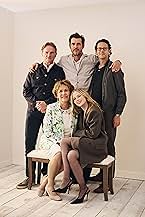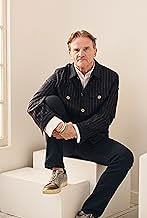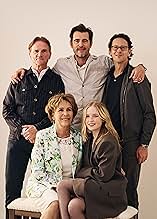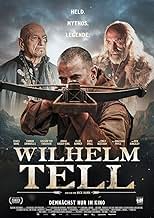Ajouter une intrigue dans votre langueThe narrative unfolds in the 14th Century amidst the days of the Holy Roman Empire where Europe's nations fiercely vie for supremacy and the ambitious Austrians, desiring more land, encroach... Tout lireThe narrative unfolds in the 14th Century amidst the days of the Holy Roman Empire where Europe's nations fiercely vie for supremacy and the ambitious Austrians, desiring more land, encroach upon Switzerland, a serene and pastoral nation.The narrative unfolds in the 14th Century amidst the days of the Holy Roman Empire where Europe's nations fiercely vie for supremacy and the ambitious Austrians, desiring more land, encroach upon Switzerland, a serene and pastoral nation.
- Prix
- 1 nomination au total
Sommaire
Reviewers say 'William Tell' is lauded for its strong performances, stunning cinematography, and historical authenticity. The narrative of rebellion against tyranny resonates, though dialogue and pacing receive mixed feedback. Some find the script theatrical, and the middle section drags. Historical accuracy and character portrayals are debated. Despite these issues, the film's epic scope and emotional depth make it a compelling historical drama.
Avis en vedette
So... I came for arrows and rebellion.
I stayed for moody stares and dramatic cloak-swishing. And I left wondering: was this a freedom fighter or a medieval therapist with anger issues?
Claes Bang plays William Tell like he's auditioning to be the next Batman - dark, brooding, and emotionally constipated. The man shoots maybe one arrow, but delivers about 947 intense silences. Respect.
Ben Kingsley shows up and casually steals every scene with the smug energy of someone who knows this isn't going to win any awards - and doesn't care. Icon.
Highlights: Gorgeous Swiss mountains.
Enough slow-motion stares to power a shampoo commercial.
Historical drama that thinks it's Shakespeare but sometimes feels more like a LARP gone rogue.
Lowlights: Pacing so slow, I checked my pulse. Twice.
A hero with all the charisma of a wet log.
Dialogue so dramatic, it circles back to being hilarious.
Bottom line: It's not a bad movie. It's just very committed to being serious... even when it really shouldn't be. Like wearing full armor to a garden party.
Watch it with wine. Or snacks. Or while folding laundry. You won't miss much if you blink - or nap.
I stayed for moody stares and dramatic cloak-swishing. And I left wondering: was this a freedom fighter or a medieval therapist with anger issues?
Claes Bang plays William Tell like he's auditioning to be the next Batman - dark, brooding, and emotionally constipated. The man shoots maybe one arrow, but delivers about 947 intense silences. Respect.
Ben Kingsley shows up and casually steals every scene with the smug energy of someone who knows this isn't going to win any awards - and doesn't care. Icon.
Highlights: Gorgeous Swiss mountains.
Enough slow-motion stares to power a shampoo commercial.
Historical drama that thinks it's Shakespeare but sometimes feels more like a LARP gone rogue.
Lowlights: Pacing so slow, I checked my pulse. Twice.
A hero with all the charisma of a wet log.
Dialogue so dramatic, it circles back to being hilarious.
Bottom line: It's not a bad movie. It's just very committed to being serious... even when it really shouldn't be. Like wearing full armor to a garden party.
Watch it with wine. Or snacks. Or while folding laundry. You won't miss much if you blink - or nap.
I found this historical drama enjoyable enough, if of highly questionable historical accuracy. The anachronistic role of women and the racial diversity of the cast is forced, very distracting, provides an unnecessary backstory to the lead character and thereby detracts from the power of the story telling. The CGI, particularly in the water-borne scenes, is poor because it is not that well done, too noticeable and in most cases unnecessary. The film makers should instead have allowed the mountain scenery to work the magic. It is really beautiful although it is not authentically Swiss (the end credits reveal it was filmed in the Italian Tyrol). The violence and the battle scenes are handled competently. Look out for a leg being detached with a scythe and a genuinely stomach-churning and realistically portrayed through-the-eye stabbing. The famous shooting the apple scene comes about half way through and seems a bit incidental to the screenplay, perhaps inserted only because audiences will expect it. All in all, there's plenty to criticize but enough positive points to make it worth watching. The end scenes set up a sequel but actually make this film end awkwardly.
An adaptation of Friedrich Schiller's 1804 play of "Wilhelm Tell" and story of the Swiss struggle for independence. Where an act of oppression, followed by unnecessary wrongdoing sparks a response that sets off a chain of events that lead to rebellion. Wilhelm Tell, master of the crossbow, involved in a conflict he would have rather not be a part of..
Visually, the film delivers beautiful landscape shots and a believable period piece, with a nicely-colored and dynamic cinematography and an excellent production! Not to mention a rather large cast of actors that present the material with strong performances.
I've read questioning of the "dialogue", but as a foreigner, I found it was easy to follow at all times and no line particularly annoying or useless.
But.. despite this strong execution, the script lacks surprises, intrigue and excitement. Making the predictable plot an expected retelling of this known story.
Don't get me wrong, it is quite solid and engaging enough.. but for 2-hour film that feels a tad long, I expected something more. It's not what I wanted it to be, but I would recommend it still to those interested and those not familiar with the famous character.
Visually, the film delivers beautiful landscape shots and a believable period piece, with a nicely-colored and dynamic cinematography and an excellent production! Not to mention a rather large cast of actors that present the material with strong performances.
I've read questioning of the "dialogue", but as a foreigner, I found it was easy to follow at all times and no line particularly annoying or useless.
But.. despite this strong execution, the script lacks surprises, intrigue and excitement. Making the predictable plot an expected retelling of this known story.
Don't get me wrong, it is quite solid and engaging enough.. but for 2-hour film that feels a tad long, I expected something more. It's not what I wanted it to be, but I would recommend it still to those interested and those not familiar with the famous character.
The movie is pretty poor, overall. But that's not what I'm here to flag... by far the most jarring aspect is they've lifted Al Pacino's Peach With Inches speech from Any Given Sunday, in parts practically verbatim, for Tell's rousing the troops before battle. WTF is that all about??
Not even a little bit, a nod to it, huge chunks.
"In any fight, it's the man whose willing to die..."
"You gotta look at the person sitting next to you, look in the eye and ask that person are you willing to die for me..." but delivered in the least inspiring, spine chilling way that it should make Pacino cry himself to sleep.
Not even a little bit, a nod to it, huge chunks.
"In any fight, it's the man whose willing to die..."
"You gotta look at the person sitting next to you, look in the eye and ask that person are you willing to die for me..." but delivered in the least inspiring, spine chilling way that it should make Pacino cry himself to sleep.
William Tell is a new action adventure film directed and written by Nick Hamm, director of Driven and The Journey.
In the 14th century, the world is in a mess after the fall of the Roman Empire. Tyrannical rulers try to take as much land as possible and keep it under their control. The Austrian ruler also tries to keep Switzerland under his leadership.
The Swiss farmer William Tell (Claes Bang) helps a fleeing man from the corrupt Austrian power and thus starts a rebellious resistance against this tyranny. In the hope of getting enough support from others, they try to end this situation, in order to start a more fair rule.
Nick Hamm has experience as a director, but for this film adaptation of the Swiss legend of William Tell, he chose to write the story of the film independently for the first time. Unfortunately, he misses the mark, because he ended up with a messy film. Where he does not always seem to have been very clear about where exactly he wanted to go with the story. As a result, the story can sometimes be difficult to follow.
This is also because the film starts at a hurried pace, but then later slows down to a long-winded pace. In the smooth introduction, too many different problems and characters are introduced, most of which have their own storylines. Most of these storylines are more separate from each other and sometimes only overlap briefly, but these overlaps do not always have the same amount of use or real meaning.
You also do not get to know the many characters well enough to really care about most of them during the final battle. When people die during this battle, you do not always know exactly who has died and you also care little about most of the lost fighters.
Most of the fights are also a bit on the hurried, simple side, because William Tell quickly manages to eliminate most of his opponents. This sometimes happens with just an arrow, despite the armor that his opponents wear.
Due to the many, smooth introductions of characters, most actors do not really get a chance to make the characters their own. Some then deliver somewhat weak or exaggerated acting.
In the 14th century, the world is in a mess after the fall of the Roman Empire. Tyrannical rulers try to take as much land as possible and keep it under their control. The Austrian ruler also tries to keep Switzerland under his leadership.
The Swiss farmer William Tell (Claes Bang) helps a fleeing man from the corrupt Austrian power and thus starts a rebellious resistance against this tyranny. In the hope of getting enough support from others, they try to end this situation, in order to start a more fair rule.
Nick Hamm has experience as a director, but for this film adaptation of the Swiss legend of William Tell, he chose to write the story of the film independently for the first time. Unfortunately, he misses the mark, because he ended up with a messy film. Where he does not always seem to have been very clear about where exactly he wanted to go with the story. As a result, the story can sometimes be difficult to follow.
This is also because the film starts at a hurried pace, but then later slows down to a long-winded pace. In the smooth introduction, too many different problems and characters are introduced, most of which have their own storylines. Most of these storylines are more separate from each other and sometimes only overlap briefly, but these overlaps do not always have the same amount of use or real meaning.
You also do not get to know the many characters well enough to really care about most of them during the final battle. When people die during this battle, you do not always know exactly who has died and you also care little about most of the lost fighters.
Most of the fights are also a bit on the hurried, simple side, because William Tell quickly manages to eliminate most of his opponents. This sometimes happens with just an arrow, despite the armor that his opponents wear.
Due to the many, smooth introductions of characters, most actors do not really get a chance to make the characters their own. Some then deliver somewhat weak or exaggerated acting.
Le saviez-vous
- AnecdotesDespite being a national hero in Switzerland, there is no concrete historical evidence that William Tell ever existed.
The earliest written account of the story appears in a 15th-century chronicle called the "White Book of Sarnen", more than a century after the events are supposed to have taken place.
Furthermore, the act of the hero shooting an apple from his son's head stems from the saga of Toko, who was a servant of the Danish King Harald Bluetooth, who died in 985. Likewise, Toko's story was written down more than two hundred years later, in the epic tale "Gesta Danorum".
Many historians view William Tell as a purely legendary figure, though his story was deeply embedded in Swiss national identity by the time of its writing.
- GaffesThe various castles are shown in their modern forms. Specifically, they have a large number of windows. These were all cut several centuries after the period in which the story is set, when castles were no longer required to be fortresses.
- ConnexionsVersion of Guillaume Tell et le clown (1898)
Meilleurs choix
Connectez-vous pour évaluer et surveiller les recommandations personnalisées
- How long is William Tell?Propulsé par Alexa
Détails
- Date de sortie
- Pays d’origine
- Site officiel
- Langue
- Aussi connu sous le nom de
- Guillermo Tell
- Lieux de tournage
- sociétés de production
- Consultez plus de crédits d'entreprise sur IMDbPro
Box-office
- Brut – États-Unis et Canada
- 43 088 $ US
- Fin de semaine d'ouverture – États-Unis et Canada
- 26 554 $ US
- 6 avr. 2025
- Brut – à l'échelle mondiale
- 680 624 $ US
- Durée2 heures 14 minutes
- Couleur
- Mixage
- Rapport de forme
- 2.39 : 1
Contribuer à cette page
Suggérer une modification ou ajouter du contenu manquant








































